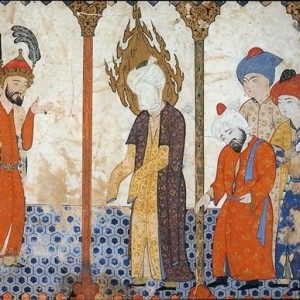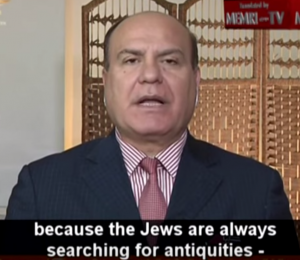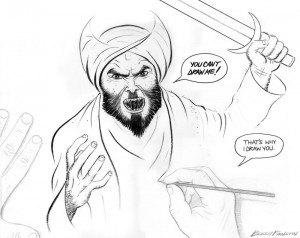Some people seem to be misunderstanding this post. I can defend Geller’s right to say whatever she wants and still criticize the way she does it without being some kind of apologist for jihad. This is something the libertarian secularists don’t seem to get because they don’t understand religion. I don’t think Geller does either. Let me offer some examples of things I would and wouldn’t say and do.
Example 1:
I believe Mohammed is a false prophet, and so must every Christian, even though saying so would offend and outrage many, perhaps most, Muslims. I’m saying it here to make a point. If my son’s Muslim friend was here, I wouldn’t say, “Hey, how ya doing! Mohammed is a false prophet you Bronze Age barbarian!” Neither would I say to a Jewish friend, “Welcome to my house, you Christ-killer. Accept the Lord!” That’s not the way decent people act.
This doesn’t change because I go from communicating with one Muslim to communicating with thousands or millions. People are not abstractions. That’s how progressives think: people are their group. It’s just bizarre to find so-called conservatives behaving the same way with Muslims.

Now, the Muslim could say: “Jesus is not the Son of God and did not rise from the dead. The Trinity is a lie.” Indeed, if he didn’t believe this, he wouldn’t be a Muslim. I don’t find that offensive. I find it wrong. Not the same thing.
This is talking about beliefs and substance. It’s provocative, but not merely for the sake of provocation. It addresses points at the heart of religious differences.
Obviously, the number of people who might be stirred to murderous outrage by someone saying “Mohammad is a false prophet” is statistically significant, while the number of people willing to kill someone for simply denying the divinity of Jesus is practically nonexistent.
This is the heart of our modern “Islam problem.” Their self-contained religious-legal system has problems with contemporary pluralism and diversity of belief. The majority of Muslim Americans make concessions to this as the price of living here. Some do not, and that’s where the violence seethes and explodes.
Example 2:
Satanists steal a Eucharist–the very body, blood, soul, and divinity of Jesus Christ–and use it in a Black Mass.
Atheists steal a Eucharist and defile it with garbage and excrement.
Both are painful, grotesquely offensive actions that wound Catholics and cry out for reparation, which we make with prayer and fasting. We are not happy about it, but we do not kill anyone over it,
Pamela Geller holds a competition to have people draw Mohammed. Many Muslims are upset by this. A statistically significant proportion of them are upset to the point of violence. Two of them actually attempt murder. Pamela Geller will never stop looking over her shoulder.
Theologically, this is nonsense, but I’m not a Muslim so the theology is meaningless to me. However, it’s a blasphemy that, to them, cries out to God for justice. Their notions of blasphemy and justice are not mine. In fact, I think their notions of blasphemy and justice are completely wrong.
And I bet they think our devotion to the Eucharist is not merely nonsense, but idolatrous and blasphemous as well.
Once again, the difference is in the reaction at the fringes. No one died because of recent high-profile cases of Eucharistic desecration, because killing people over that would be barbaric and un-Christian.
However, many have died over The Dreaded Cartoons of Blasphemy and Other Insults to Mohammed, because certain interpretations of the hadith are rigidly aniconic, associating depictions of Mohammed with idolatry. In some schools of thought, the math is simple: idolatry is blasphemy and blasphemy is punished by death.
Islam is not monolithic about this at all: there is far more diversity in the theology than modern encounters with Islam would suggest. We hear about the extremes because the extremes are deadly, but we can’t be lulled into thinking that the extremes are normative. It’s like seeing Christian snake handling cults and thinking all Christianity is like that. We don’t like when people generalize about Jews, or Christians, or conservatives, so why do it to Muslims? “Because 9/11?” or “Because ISIS?” Is that what passes for thought now?
Yes, way too many Muslims are willing to murder for their faith. It’s a much higher percentage than is found in any other religion, and Islam needs to deal with that problem. Justification for violence is embedded deeply in their history, tradition, and texts, and the happy noise made by good, peaceful Muslims doesn’t drown out the bloodcurdling shrieks of their coreligionists. They need to confront a simple reality: their texts and traditions provide ample justification for violence in a way Christianity, Judaism, Hinduism, and Buddhism do not.
What they need to realize is that their theology alone does not provide a compelling reason for us to change our behavior.
When religions need share space with each other and with the irreligious, we adapt to certain civilized standards of behavior. We don’t judge everyone in a group by the behavior of its worst members. We don’t impose arcane legal codes on non-believers. Jews don’t get to ban ham. Hindus don’t insist that all Burger Kings and Sonics are closed. Catholics don’t get to punish people for eating meat on Friday. And Muslims don’t get to kill people for drawing Mohammed. In other words: suck it up, buttercup. It’s a big world. Take the advice of Jesus, and “Pray for those who persecute you.”
But at the same time we don’t need to go out of the way to make empty and thoughtless provocations for their own sake, or to prove some point about free speech. These are the little concessions we make in a pluralistic civilization. We make them to keep the peace, not because we’re wimps or dhimmi or whatever buzzwords the Twitter commandos are deploying at the moment, but because we’re not d@#ks.
Is making more cartoons going to have some positive effect? Is it going to encourage non-violent Muslims (ie, the majority of them) to slap their foreheads and say, “Thank you, Brave Truth Teller! Now I see how foolish I am to be offended by this. Where is the nearest megachurch so I may be baptized and join the GOP?” Is it going to encourage them to report the extremists in their midst? Is it going to assure them that we don’t hold them in contempt for their beliefs? Is it going to draw Muslims further into American culture, or push them away?
Related:
William Kilpatrick offers a completely different perspective at Catholic World Report. Obviously, I don’t agree, but he makes his case better than others I’ve read.











